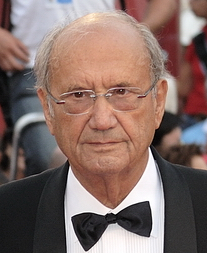Pere Portabella
| Pere Portabella | |
|---|---|
 |
|
| Member of Senate of Spain | |
|
In office June 15, 1977 – March 1, 1979 |
|
| Personal details | |
| Born |
Pere Portabella i Ràfols March 11, 1929 Figueres, Catalonia, Spain |
| Website | pereportabella.com |
Pere Portabella (Catalan pronunciation: [ˈpeɾə ˌpɔrtəˈβeʎə j ˈrafuɫs]; born February 11, 1929) is a Spanish politician, director, and producer. In 1977, he was elected Senator in Spain's first democratic elections and participated in the writing of the Spanish Constitution. As a filmmaker, his style is experimental, reaching new aspects of film language, often with a poetic tone and social content. Portabella is hailed as an essential figure in the political and cultural history of Spain.
Raised among the great Catalan industrial bourgeoisie, Portabella moved at an early age to study chemistry in Madrid. There he met artists such as Joan Ponç, Antoni Tàpies and students at the Escuela Oficial de Cine (EOC), including Carlos Saura and Julio Diamante. The first contacts Portabella made with the world of cinema came in 1958, where he met Leopoldo Pomés in order to make a documentary on bullfighting. Portabella took on the role of producer, while the co-director of the short film was Carlos Saura. Portabella lamented an inability to edit the material into a meaningful structure, remarking, "We got a lot of beautiful pictures, but they had nothing to say or offer." After the failure of this project, Portabella decided to devote himself fully to productions related to the socio-political reality of the period.
In 1959, he set up the production company Film 59, which began its activity with the production of two films influenced by Italian neorealism: Los golfos (Thugs, 1960) by Carlos Saura and El cochecito (1960) by Marco Ferreri. In 1960, Los golfos was screened at the Cannes Film Festival, where Portabella met Luis Buñuel. He convinced Buñuel to return to Spain and shoot Viridiana. Co-produced by Mexican Gustavo Alatriste - the Spanish company UNINCI headed by Bardem and Ricardo Muñoz Suay - and Movies 59, Buñuel's film, despite numerous script corrections made at the request of the Director General of Cinematography, openly parodied symbols of the Spanish state religion. Presented at the Cannes Film Festival in 1961, where the film earned the Palme d'Or, Viridiana caused a famous scandal.
...
Wikipedia
